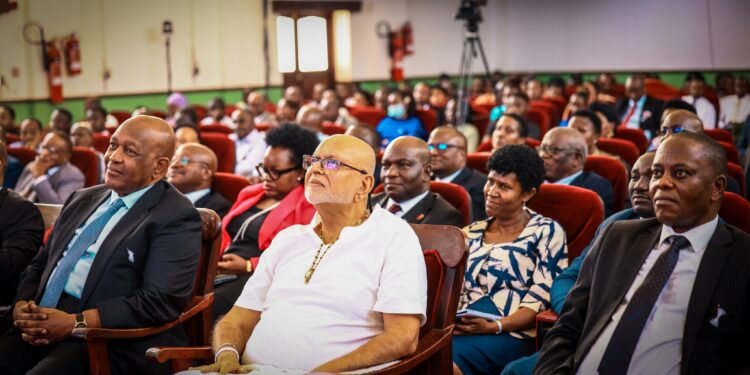KAMPALA, Uganda — In the vibrant chaos of Kampala’s streets, where construction cranes punctuate the skyline and ambition fuels the city’s pulse, Dr. Sudhir Ruparelia stands as a colossus of wealth and vision. The 69-year-old billionaire, who arrived in Uganda with just $25,000 in 1985, has sculpted a $1.2 billion empire through the Ruparelia Group, commanding over 400 properties that define the nation’s commercial landscape.
In a riveting feature published on April 16, 2025, by CEO East Africa Magazine, Ruparelia unveils his 10 Golden Rules for Real Estate Investment, a masterclass in wealth-building drawn from 35 years of triumphs, setbacks, and unrelenting discipline. His journey—from a refugee boy to Uganda’s richest man—is not just a story of riches but a blueprint for anyone daring to dream big.
Ruparelia’s saga begins in the shadow of exile. Expelled from Uganda during Idi Amin’s regime in the 1970s, he spent his youth in the UK, working odd jobs and saving every penny. When he returned to Kampala in 1985, his $25,000 was a modest seed, but his ambition was boundless. Starting with small property acquisitions, he added value with simple touches—planting trees, upgrading structures—and watched his investments grow. Over three decades, his Ruparelia Group blossomed into a conglomerate spanning real estate, banking, education, hospitality, agriculture, and media. Landmarks like Speke Resort Munyonyo, Kingdom Kampala, and the $10 million Kololo mansion he calls home testify to his Midas touch.
In his airy Kololo office, adorned with accolades like the 2013 Golden Jubilee Presidential Medal, Ruparelia shares the principles that turned his vision into reality. His 10 Golden Rules are not mere tips but hard-earned lessons, each rooted in a moment of his remarkable ascent. They resonate with the pragmatism of a man who built a fortune without shortcuts, even as he navigates modern challenges like a recent deepfake AI scam misusing his image—a reminder of his towering influence.
Golden Rule 1: Embrace Condominiums as the Future
Ruparelia’s first rule reflects Kampala’s evolving landscape. “Land is scarce, and prices are soaring,” he says, gesturing toward the city’s skyline. “Condominiums are the future—build upwards to save space and cut commutes.” His own high-rise projects, like commercial hubs in Nakasero, embody this vision. “Bungalows in the city center are relics,” he adds, urging investors to prioritize vertical living to meet urban demand.
Ruparelia’s first rule reflects Kampala’s evolving landscape. “Land is scarce, and prices are soaring,” he says, gesturing toward the city’s skyline. “Condominiums are the future—build upwards to save space and cut commutes.” His own high-rise projects, like commercial hubs in Nakasero, embody this vision. “Bungalows in the city center are relics,” he adds, urging investors to prioritize vertical living to meet urban demand.
Golden Rule 2: Choose Mortgages Over Rent
For young professionals trapped in Kampala’s rental cycle, Ruparelia’s advice is a wake-up call: “If your mortgage payment matches your rent, take the mortgage.” He recalls his early days, scraping by to invest in property. “Renting is burning money. A mortgage builds equity.” This rule, he says, is about shifting mindsets from consumption to ownership, a cornerstone of his wealth.
For young professionals trapped in Kampala’s rental cycle, Ruparelia’s advice is a wake-up call: “If your mortgage payment matches your rent, take the mortgage.” He recalls his early days, scraping by to invest in property. “Renting is burning money. A mortgage builds equity.” This rule, he says, is about shifting mindsets from consumption to ownership, a cornerstone of his wealth.
Golden Rule 3: Start Small, Build Gradually
Ruparelia’s empire began with humble steps. “Buy a small plot, add a tree, improve the structure,” he advises. “Small wins compound.” He shares a memory of his first property, a modest building he enhanced with basic upgrades. “You don’t need millions to start—just discipline to grow steadily.” This rule speaks to patience, a virtue he credits for his longevity.
Ruparelia’s empire began with humble steps. “Buy a small plot, add a tree, improve the structure,” he advises. “Small wins compound.” He shares a memory of his first property, a modest building he enhanced with basic upgrades. “You don’t need millions to start—just discipline to grow steadily.” This rule speaks to patience, a virtue he credits for his longevity.
Golden Rule 4: Avoid Over-Borrowing
Debt, Ruparelia warns, is a double-edged sword. “Don’t borrow to expand too fast,” he says, shaking his head. “I grew organically, using profits, not loans.” His caution stems from watching peers falter under reckless debt. “Borrow only what your business can sustain,” he insists, a lesson that kept his empire resilient through economic storms.
Debt, Ruparelia warns, is a double-edged sword. “Don’t borrow to expand too fast,” he says, shaking his head. “I grew organically, using profits, not loans.” His caution stems from watching peers falter under reckless debt. “Borrow only what your business can sustain,” he insists, a lesson that kept his empire resilient through economic storms.
Golden Rule 5: Build Cash Flow First
Before diving into real estate, Ruparelia urges aspiring investors to secure a financial foundation.
Before diving into real estate, Ruparelia urges aspiring investors to secure a financial foundation.
“Work hard at one or two businesses,” he says. “Use that cash to build your first house—without a loan if possible.” He recalls bootstrapping his early ventures, from trading to small-scale property deals, to generate the income that fueled his real estate bets.
Golden Rule 6: Borrow Sustainably
While cautious about debt, Ruparelia isn’t dogmatic. “Borrowing is fine if the loan repayment equals your current rent,” he explains. This rule, rooted in his early mortgage decisions, ensures investments don’t strain finances. “It’s about balance,” he says, a principle that allowed him to scale without collapsing under debt.
While cautious about debt, Ruparelia isn’t dogmatic. “Borrowing is fine if the loan repayment equals your current rent,” he explains. This rule, rooted in his early mortgage decisions, ensures investments don’t strain finances. “It’s about balance,” he says, a principle that allowed him to scale without collapsing under debt.
Golden Rule 7: Capitalize on Growing Demand
Ruparelia’s foresight shines in his focus on Uganda’s urbanization. “The population is flooding cities,” he notes. “There’s demand for offices, warehouses, and low-cost housing—not just in Kampala but in Masaka, Gulu, and beyond.” His portfolio, from industrial parks to affordable apartments, reflects this trend, positioning him to profit from demographic shifts.
Golden Rule 8: Prioritize Prime Locations
“Location is everything,” Ruparelia declares, a mantra evident in his high-occupancy buildings. “A prime spot guarantees tenants and value.” He recounts choosing plots in Kampala’s bustling districts, ensuring long-term returns. “A bad location is a losing bet, no matter how cheap,” he warns, urging investors to research thoroughly.
“Location is everything,” Ruparelia declares, a mantra evident in his high-occupancy buildings. “A prime spot guarantees tenants and value.” He recounts choosing plots in Kampala’s bustling districts, ensuring long-term returns. “A bad location is a losing bet, no matter how cheap,” he warns, urging investors to research thoroughly.
Golden Rule 9: Plan with Clear Purpose
Every Ruparelia project starts with a blueprint. “Know your goal—residential, commercial, or mixed-use,” he says. “Plan with intention.” He shares an anecdote about a hotel project that succeeded because of meticulous planning. “A clear purpose saves time and money,” he adds, a rule that underpins his efficient empire.
Every Ruparelia project starts with a blueprint. “Know your goal—residential, commercial, or mixed-use,” he says. “Plan with intention.” He shares an anecdote about a hotel project that succeeded because of meticulous planning. “A clear purpose saves time and money,” he adds, a rule that underpins his efficient empire.
Golden Rule 10: Practice Patience
Above all, Ruparelia preaches patience. “My wealth took 35 years,” he says, his eyes crinkling with a smile. “There’s no overnight success.” He reflects on decades of steady growth, resisting the lure of quick gains. “Stay focused, stay patient, and the results will come.” It’s a fitting capstone for a man whose fortune is a testament to endurance.
Above all, Ruparelia preaches patience. “My wealth took 35 years,” he says, his eyes crinkling with a smile. “There’s no overnight success.” He reflects on decades of steady growth, resisting the lure of quick gains. “Stay focused, stay patient, and the results will come.” It’s a fitting capstone for a man whose fortune is a testament to endurance.
Beyond his business acumen, Sudhir Ruparelia’s heart lies in giving back. Through the Ruparelia Foundation, he funds education, healthcare, and wildlife conservation, earning him admiration as a philanthropist. His recent warning against a deepfake scam underscores his commitment to protecting the trust he’s built. Yet, his focus remains on empowering others, sharing his golden rules to inspire a new generation.
As Kampala’s skyline soars, Ruparelia’s legacy looms large. From a $25,000 gamble to a $1.2 billion dynasty, his 10 Golden Rules—condominiums, mortgages, small starts, cautious borrowing, cash flow, demand, location, planning, and patience—offer a roadmap for wealth in any era. In a world chasing instant riches, Ruparelia’s story is a clarion call: true success is built slowly, deliberately, and with unwavering purpose.
Read the full article at www.ceo.co.ug.
Do you have a story in your community or an opinion to share with us: Email us at editorial@watchdoguganda.com













